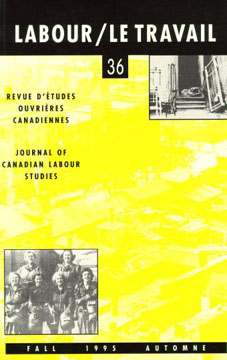Abstract
At the heart of Canada's "Fordist" class compromise after World War II lay a new unionism which reinforced managerial control in the workplace. By repudiating rank-and-file initiatives against various dimensions of management control of the labour process, the new unionism displaced a potentially transformative kind of unionism that arose during the war. The significance of this transition is explored through a comparative examination of the relations between union leaders and members at two autoworker locals, one of which exemplified the ran-and-file-oriented local unionism of the war years, the other the new centralized unionism which came in its wake. It is argued that this transition to a new unionism was a key contributor to the marginalisation of class-based politics in Canada after the war.
Résumés
Au coeur du compromis de classe «fordiste» au Canada après la Deuxième guerre mondiale, on trouve un nouveau genre de syndicalisme qui renforce le contrôle patronal sur les lieux de travail. Le nouveau type de syndicalisme déloge une forme de syndicalisme plus militante apparue pendant le conflit mondial, en répudiant ces initiatives venues de la base visant à contrer différentes dimensions du contrôle patronal sur l'organisation du travail. Par l'analyse comparative des relations entre les dirigeants syndicaux et leurs membres dans deux syndicats locaux, l'article vise à comprendre la signification de cette transition. L'un des locaux représente le modèle du militantisme «de la base» des années de la guerre, tandis que l'autre illustre le syndicalisme centralisé qui lui a succédé. Selon cet article, la transition vers une nouvelle forme de syndicalisme est un facteur clef contribuant à la marginalisation des politiques de lutte «classe contre classe» après la guerre.
